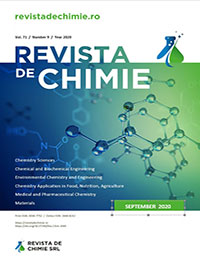|
REVISTA DE CHIMIE Cite as: Rev. Chim. https://doi.org/10.37358/Rev.Chim.1949 OSIM Nr. R102355 ISSN Online 2668-8212 ISSN Print: 1582-9049 ISSN-L: 1582-9049 |

LATEST ISSUE >>> |
| Volume 77, 2026 |
| Volume 76, 2025 |
| Volume 75, 2024 |
| Volume 74, 2023 |
| Volume 73, 2022 |
| Volume 72, 2021 |
| Volume 71, 2020 |
| Volume 70, 2019 |
| Volume 69, 2018 |
| Volume 68, 2017 |
| Volume 67, 2016 |
| Volume 66, 2015 |
| Volume 65, 2014 |
| Volume 64, 2013 |
| Volume 63, 2012 |
| Volume 62, 2011 |
| Volume 61, 2010 |
| Volume 60, 2009 |
| Volume 59, 2008 |
| Volume 58, 2007 |
|
|






